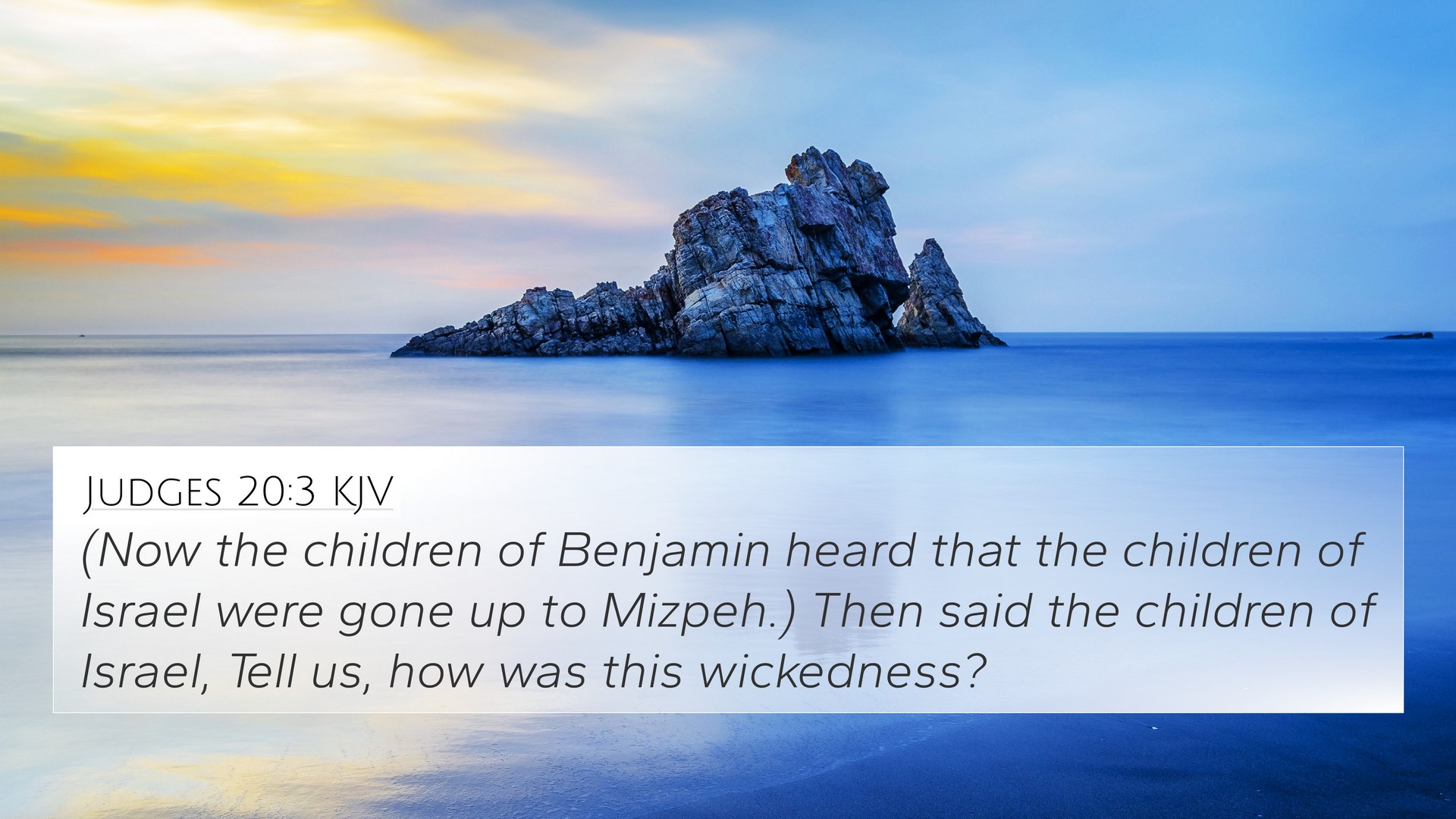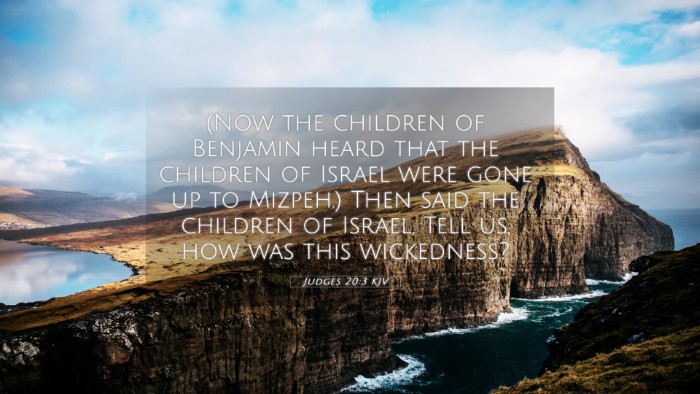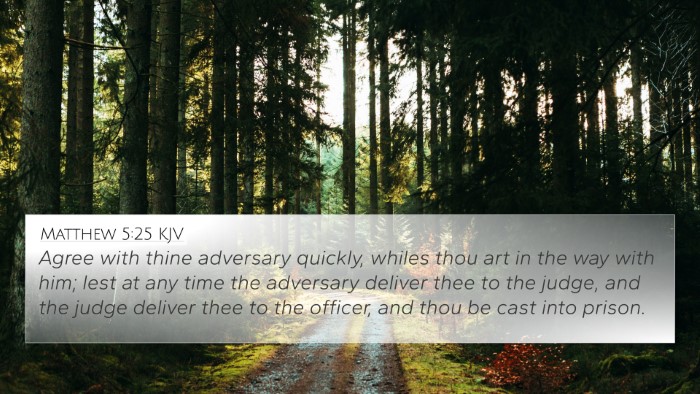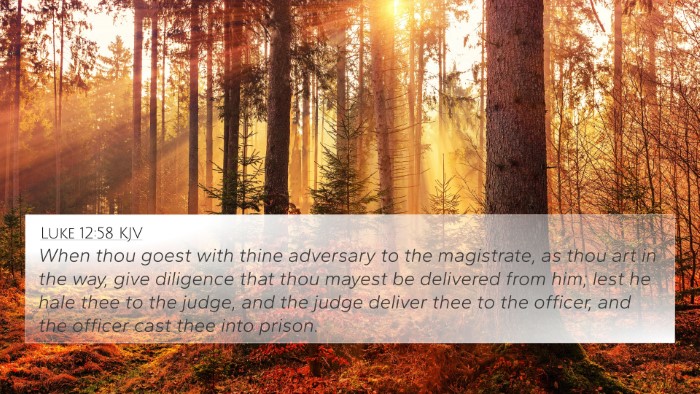Understanding Judges 20:3
Judges 20:3 presents a pivotal moment in the narrative of the Israelites during the era of the judges. The verse states, “Now the children of Benjamin heard that the children of Israel had gone up to Mizpah. Then the children of Israel said, ‘Tell us, how did this wicked deed happen?’” This inquiry highlights the collective responsibility among the tribes and the grave concern over moral and social decay.
Insights from Public Domain Commentaries
This verse serves as a crucial point of dialogue within a larger narrative about justice, accountability, and the communal aspect of sin and repentance.
- Matthew Henry: Henry emphasizes the notion of accountability that permeates this passage. The Israelites recognized the need to confront sin seriously, indicating a unified approach to maintain holiness among God’s people.
- Albert Barnes: Barnes states that the gathering at Mizpah signified a moment of national concern, showcasing how the gravity of the situation compelled the tribes to seek understanding and resolution. The moral outrage over the wicked deed demonstrates the seriousness with which they viewed communal sin.
- Adam Clarke: Clarke elaborates on the actions taken by the Israelites as they gathered to deliberate the matter. His commentary indicates an underlying call for justice, reflecting a desire to rectify wrongdoing and to restore order within the community.
Cross-References Related to Judges 20:3
In understanding Judges 20:3, it is essential to consider various Bible verse cross-references that provide insight into its themes and messages:
- Genesis 18:20-21: Highlights God’s response to sin and the necessary judgment it incurs.
- Deuteronomy 19:15: Discusses the laws regarding witnesses and the importance of communal responsibility in justice.
- Joshua 7:19-21: Reflects on Achan’s sin and its repercussions for the nation, emphasizing corporate accountability.
- 1 Samuel 10:17-19: Situates national gatherings in a context of collective understanding and response, similar to the scenario in Judges.
- 2 Samuel 21:1-14: Examines national sin and its consequences, mirroring the collection of Israelites at Mizpah for answers.
- Ezekiel 18:30: Calls for repentance and accountability within a community, highlighting themes of collective sin and redemption.
- Matthew 18:15-17: Jesus addresses how to deal with sin within the community, reflecting the proactive nature of seeking correction and resolution.
- Romans 14:12: "So then each of us will give an account of himself to God," emphasizes personal accountability within the communal aspect of faith.
- 1 Corinthians 5:6-7: Paul speaks about the threat of unjudged sin within the community of believers, correlating to the seriousness seen in Judges 20:3.
- Galatians 6:1: Encourages restoring those caught in sin, reflecting the underlying theme of seeking to correct wrongs within the community.
Thematic Connections and Interpretations
The connections between Bible verses woven throughout Scripture can provide a deeper understanding of Judges 20:3. The practice of cross-referencing Biblical texts reveals a rich tapestry of themes such as sin, accountability, community responsibility, and the quest for justice.
Key Themes in Judges 20:3
- Sin and Consequence: The passage underscores the need for acknowledgment and confrontation of sin within the community.
- Accountability: It raises pivotal questions about individual and collective accountability before God.
- Community Responsibility: Reflects on the shared duty of the Israelites to uphold moral standards and seek justice.
- Dialogues on Justice: Illuminates how communal discussions can lead to resolution and restoration.
Using Cross-References for Deeper Study
To maximize understanding of the Scriptures, employing tools for Bible cross-referencing can enhance studying the connections and themes found in the Bible. Utilizing a Bible concordance or a Bible cross-reference guide aids in uncovering relationships between various scriptures.
Practical Applications
- Bible Cross-Reference System: Familiarize yourself with a structured approach to finding related verses.
- Cultural Context: Understanding the historical and cultural backgrounds enhances comprehension of passages like Judges 20:3.
- Sermon Preparation: Use cross-referenced themes to create cohesive messages that resonate with audiences about justice and accountability.
- Personal Reflection: Engage with the text by considering how these themes apply to individual lives and communities today.
Conclusion
The verse Judges 20:3 encapsulates a moment of collective reflection and interrogation of sin, leading to intense communal dialogue. By exploring comparative Bible verse analysis and thematic connections, individuals can deepen their understanding of this passage and apply its lessons to modern faith practice. Through careful cross-referencing Bible study methods, each reader can uncover invaluable insights that enrich their spiritual journey.







